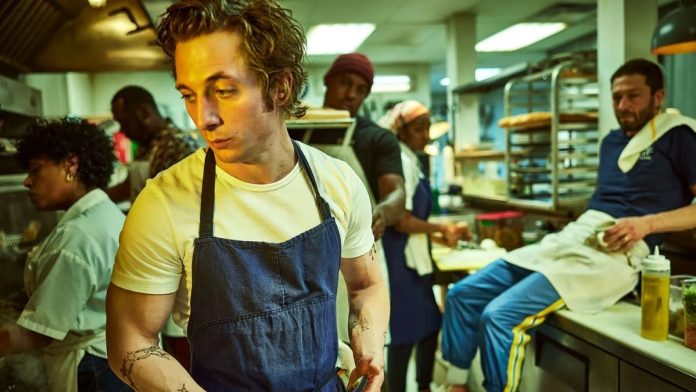When The Bear begins, Carmy Berzatto stands alone in the cramped back room of The Original Beef of Chicagoland. A single guitar chord cuts through the sizzle of oil and the scrape of pans, and suddenly the room feels charged with the ghosts of Chicago’s musical past, from the electric Delta blues that revved up South Side juke joints to the late-night punk raves in West Loop basements and the earnest indie rock echoing through neighbourhood halls. As Carmy wrestles with his brother’s legacy and the weight of every order, these songs and Jeff Russo’s understated score cast his struggle in a broader sweep of working-class determination, fleeting triumphs and the unspoken bonds that hold a team together.
Chicago’s Musical Roots and the Series’ Soundtrack
Chicago’s musical identity has always been shaped by waves of reinvention. In the 1940s, Delta blues artists such as Muddy Waters and Howlin’ Wolf migrated north and transformed the sound of the South Side, plugging in electric guitars and amplifiers to fill cavernous juke joints. Their pioneering recordings laid the groundwork for a city in search of a raw, expressive voice. Three decades later, in the smoky basements and converted warehouses west of the Loop, punk and post-punk bands like Naked Raygun and Big Black harnessed that same electric intensity, trading long guitar solos for jagged riffs and urgent, shouted vocals. By the 1990s, a new wave of homegrown talent – most notably Wilco, formed by former members of Uncle Tupelo, and Smashing Pumpkins, led by Billy Corgan – married introspective lyrics with soaring guitars. Wilco’s early albums fused country twang with fractured rock by combining slide guitars and pedal steel with jagged, feedback-driven riffs, a sound born from musicians rooted in Midwestern farm towns who found themselves in Chicago’s industrial sprawl. Smashing Pumpkins layered piano and string arrangements over distorted power chords, mirroring the city’s mix of monumental landmarks and gritty back-street venues, where grand ambition met everyday struggle.
In The Bear, this lineage comes to life in Carmy Berzatto’s kitchen. Wilco’s “Via Chicago” underscores a long, silent shot of Carmy manning the stove; the song’s measured guitar riff parallels his dogged refusal to yield under relentless orders. Counting Crows’ “Mr Jones,” though penned by a band from California, fits neatly into this lineage, its yearning chords echoing the momentary calm after service rushes, as though the cooks themselves have slipped back into a bar for a last round before heading home. The series forgoes period pieces or overt nostalgia; instead, it layers these tracks over modern, frenetic cooking sequences, suggesting that Chicago’s musical spirit remains alive in every slice of beef and stir of sauce.
By tracing this arc, The Bear places its story inside a living continuum, where each guitar lick or drumbeat carries echoes of past revolutions. As the kitchen staff navigates chaos and camaraderie, the music reminds viewers that Chicago’s heart has always beaten in time to its own unexpected rhythms.
When Music Moves the Plot
Early in season one, Pearl Jam’s “Daughter” surfaces during a tense argument between Carmy and Sydney. The song’s quiet opening chords swell into powerful waves of frustration in parallel with their voices. No scene needs narration. The audience understands through the music how high the stakes have become. Later, when Refused’s “New Noise” erupts, the choice feels urgent. Carmy stands amid ruined ovens and orders, desperate to reclaim something real. The song’s shouted vocals mirror his own internal argument between giving up and pushing on. A few episodes later R.E.M.’s “Strange Currencies” drifts over a montage of mise en place, the chorus swelling as lyrics about uncertain love echo Carmy’s doubts about reviving the kitchen.
Russo’s Score
Under the familiar tracks, composer Jeff Russo threads piano and strings that respond to Carmy’s quietest moments. In the early episodes Russo uses a single piano note that repeats between scenes of solitude. That note becomes a signpost for Carmy’s private anguish. When he confronts the memory of his brother with a battered photo album, a cello joins, its low tone matching his grief. By season two these themes evolve. The piano melody gains warmth when Carmy shares a meal with the staff or smiles at a small success. Music here does more than hit emotional peaks, tracking the small shifts inside a man trying to find his balance after loss.
Music as Community
The Original Beef of Chicagoland feels like more than a kitchen; it is a place where bruised cooks swap jabs and end the night in laughter. The soundtrack fuels that energy. A Smashing Pumpkins riff cuts through the clang of pans, or Russo’s muted trumpet softens a tense prep line. Bands that once filled grimy basements now animate every moment of pressure or release. Even the final garnish on a plate carries the weight of those old records, stitching the staff together through sweat and shared melodies.
By the time the credits roll on each episode, the music of The Bear has done more than underscore a restaurant drama. It has threaded Chicago’s past through every scene, from the Delta blues that first electrified the South Side to the punk shows in West Loop basements. Wilco and Smashing Pumpkins carry the city’s reinvention into Carmy’s kitchen, while Pearl Jam’s “Daughter” and R.E.M.’s “Strange Currencies,” despite originating in Seattle and Georgia, slip seamlessly into the action, speaking to universal doubts and determination. Refused’s “New Noise” jolts the narrative into chaos just as Carmy confronts the wreckage of his ambitions, and Jeff Russo’s shifting piano notes and strings map his private struggle. The result is a soundtrack that never stands apart from the story; it rises from the clatter of pans and the hush of reflection to shape every moment of loss, effort and fellowship. In The Bear, each chord marks a step on Carmy’s path, and every song, local or not, deepens the kitchen’s fierce, uncompromising beat.



